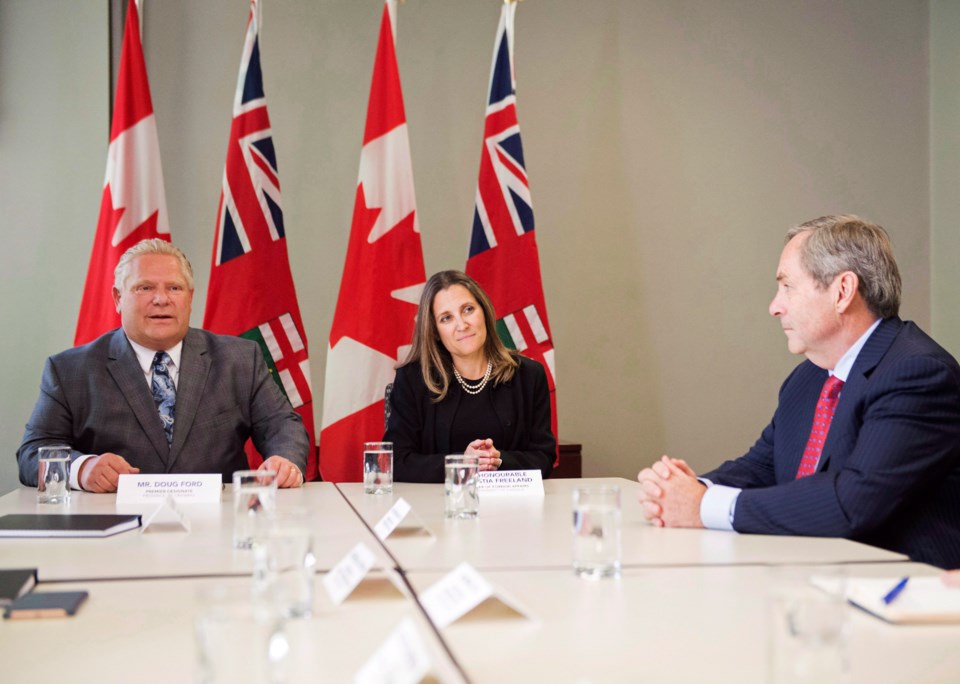EDITOR'S NOTE: This article originally appeared on The Trillium, a Village Media website devoted exclusively to covering provincial politics at Queen’s Park.
Ontario Premier Doug Ford is calling on Mexico to match Canadian and U.S. tariffs placed on China and suggesting, if it doesn’t, the two countries should cut it out of its trilateral trade agreement.
Ford, on Tuesday, accused Mexico of being a “backdoor for Chinese cars, auto parts and other products into Canadian and American markets.”
“If Mexico won’t fight transshipment by, at the very least, matching Canadian and American tariffs on Chinese imports, they shouldn’t have a seat at the table or enjoy access to the largest economy in the world,” the premier said.
“Instead, we must prioritize the closest economic partnership on earth by directly negotiating a bilateral U.S.-Canada free trade agreement that puts U.S. and Canadian workers first.”
The Canada-United States-Mexico Agreement (CUSMA), which replaced the North America Free-Trade Agreement (NAFTA), is set to be reviewed in 2026.
President-elect Donald Trump has already said he'll seek new protections for the American auto industry, including clauses to stop Chinese auto companies from building plants in Mexico, where their products are then sent across the border under CUSMA's duty-free import rules.
It’s a pitch being echoed by Ford, who told reporters at a news conference in Barrie, Ont., that Mexico is importing cheap products, “slapping a made-in-Mexico sticker on, and shipping it up.”
“It's ridiculous, and they're undercutting the market,” he said.
“What I'm proposing to the federal government, we do a bilateral trade deal with the U.S., and if Mexico wants a bilateral trade deal with Canada, God bless them," Ford said. "But I'm not going to be drawn down with these cheap imports, taking men and women's jobs from hard-working Ontarians.”
Deputy Prime Minister and Finance Minister Chrystia Freeland’s office used similar language when asked for a comment on the premier’s statement, saying, “Canada will not be a backdoor to other markets, especially to our most important friend and ally, the United States.”
“Canada firmly believes that action is necessary to level the playing field for Canadian workers in the face of China’s intentional, state-directed policy of overcapacity. That is why we have put strong tariffs on Chinese electric vehicles, steel, and aluminum,” Freeland's spokesperson Katherine Cuplinskas said in a statement to The Trillium.
Freeland's office did not say whether Canada would consider a bilateral trade agreement with the U.S. rather than maintaining a North American agreement with all three countries.
Over the summer, Canada announced a 100 per cent surtax on all Chinese-made electric vehicles and a 25 per cent tariff on steel and aluminum products. The tariffs on Chinese EVs went into effect Oct. 1, with the steel and aluminum tariffs kicking in Oct. 22. The federal government is also conducting consultations on whether to expand those tariffs, similar to the U.S., which also instituted tariffs on made-in-China batteries, semiconductors, solar cells and is proposing a ban on vehicle software and hardware.
Freeland noted last week that these tariffs provide Canada a “firm foundation” heading into negotiations with the new Trump administration.
Trump has previously said he would impose tariffs of at least 200 per cent on all vehicles imported from Mexico and impose higher tariffs on Chinese companies operating in the country.
